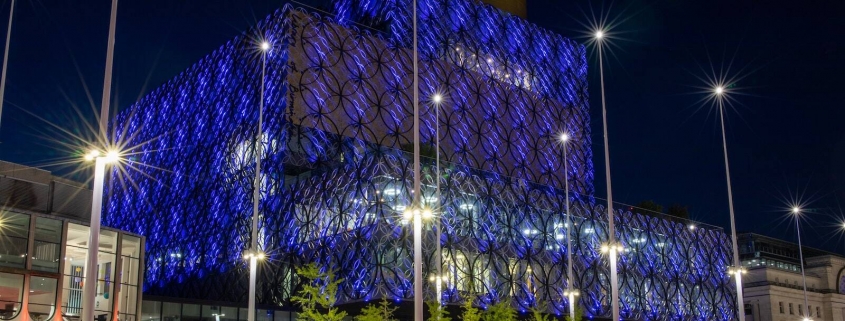In recent years, the West Midlands has emerged from the decline of its traditional industries to become a thriving tech hub. We interviewed several key figures within the region for our Digital Revolution research to understand why and how this has happened and what the future holds.
Peter Bishop, CIO of Birmingham City Council, told us how the region had “lost its way” since the 1970s as its manufacturing base was eroded by globalisation. The latter half of the 20th century was difficult for the region as it developed a reputation as a rough around the edges former industrial powerhouse, but this has changed.
Birmingham has shed its former image over the past decade with a significant push towards modernisation. Developments like the Bullring, the Cube and the Mailbox, huge businesses like HSBC setting up here and a cultural renaissance centred in bohemian Digbeth have transformed Birmingham into one of the UK’s most desirable locations.
LOCATION
The West Midlands’ is ideally located for digital revolution businesses.
Its’ central location means that businesses can travel around the country and it is low cost combined with a lively social scene so is attractive to young tech workers and businesses.
Alex Loquens, Network and Infrastructure Manager at the RSC in Stratford-upon-Avon told us how the region’s central location is great for business. You can reach most major English cities in under 2 hours and this makes it a great location for firms with a national focus.
Dania Lyons, from tech recruitment consultancy Mortimer Spinks, told us how businesses looking to set-up in the UK were shying away from London because of the high costs, and that the West Midlands offers an attractive alternative. The UK’s second city is significantly cheaper than the capital whilst offering great transport links to both it and other major cities in the north.
Birmingham particularly has a lot to offer young tech workers. Recent research by Serviceteam IT found that 95% of businesses faced a digital skills shortage with software development being the worst affected area. Software development is both an internationally mobile career and a young one. To attract skilled tech workers, a region must have a lot to offer young people to tempt them away from the allure of other cities like London. Birmingham’s thriving independent scene and the revitalisation of tired industrial Digbeth into the UK’s “coolest place to live” (The Times, 2018) offer an attractive proposition.
INFRASTRUCTURE
The West Midlands is also at the forefront of several exciting digital revolution infrastructure projects that will benefit the region’s tech ecosystem.
HS2 will mean that the region is more closely connected to the capital and the rest of the country than ever before. Phase 1 will reduce journey times between Birmingham and London by 35 minutes, from 1 hour and 24 minutes to 49 minutes. After phase 2 is completed, journey times between Birmingham and rest of the country, particularly the north, will also be significantly reduced. This will bring additional investment into the region. Its central location makes doing business around the country easy and so it is an obvious choice for businesses with national ambitions.
5G is another development that the West Midlands is leading the way in. In 2018 it was announced that Birmingham would be the location for the UK’s first “5G test-bed”. 5G is set to be far faster and more reliable, with greater capacity and lower response times. This will open up a whole host of new possibilities. Not only will it mean instant 4K video streaming and Wi-Fi speed connectivity anywhere, it will create a range of capabilities for emerging technologies.
5G opens the door to many new technologies. For example, AR and VR will be much easier to integrate into people’s devices and their environment if they can be connected anywhere. It also creates new possibilities for IoT devices which can receive high speed connections regardless of location.
TALENT
One of the biggest problems facing the digital revolution across the UK is a lack of skilled workers, and this is no different in the West Midlands. Our research found that the skills shortage is a real problem across the tech sector, with particular shortages in software and high-tech roles.
The West Midlands is home to several internationally renowned universities. There are 12 in total, with 2 members of the prestigious Russell Group in the University of Birmingham and the University of Warwick. Therefore, the West Midlands is producing a large amount of high-quality graduates who can help alleviate the skills shortage. However, in 2018 only 19% of graduates from these universities remained in the West Midlands. This exacerbates the tech skills shortage because businesses need graduates, particularly from STEM subjects, to fill these kinds of roles.
Dania Lyons, from recruitment consultants Mortimer Spinks, told us that businesses and schemes can take advantage of the West Midlands’ young, diverse population to solve the skills shortages they face, tackling two problems at once. Birmingham has a young, diverse population. This represents a huge untapped resource of potential tech talent. Businesses can help to solve the skills shortage whilst also improving diversity within the industry by providing training schemes to underrepresented groups. One great example of this in the Midlands is the School of Code. This free coding bootcamp’s intake is diverse and gives opportunities to those who would otherwise not have access to them.
INVESTMENT
One issue that affects all areas outside of London is a lack of investment in tech businesses. The majority of investment is located in the capital because it is the biggest tech hub in Europe, where the digital revolution began far earlier. This leaves the regions lacking funding.
Several interviewees highlighted how Brexit was reducing the funding available to them. This is due both to a reduction in external investment as well as investment in new ideas by companies already in the West Midlands.
Anthony Khan, from the research commercialisation team at the University of Birmingham, told us how investment in high-tech research in the region was drying up because of Brexit. Whilst there are several top-tier research institutions, the funding for the blue-sky, speculative research that innovation comes from has dried up as there is an increased focus on ROI.
Despite this, Birmingham is the city with the highest number of start-ups in the UK, outside of London. It is also the region with the highest level of FDI outside of London. This also demonstrates that the West Midlands is an internationally attractive place to do business, something reflected in Dania Lyons’ telling us that foreign companies are asking about moving to the West Midlands because of London’s prohibitive costs.
INITIATIVES
James Sharp, from the research commercialisation team at the University of Birmingham, told us that the ingredients for a thriving tech ecosystem existed in the West Midlands, we now need initiatives to transform this potential into the reality of a digital revolution.
He said that businesses in the region, particularly large recent arrivals, should be doing more to foster the local ecosystem. He referred to a lack of collaboration with universities, something he was personally experienced in. The University of Birmingham produces huge amounts of valuable and useful research every year but it never reaches industry because of a lack of interest and investment from businesses. This needs to change if the West Midlands is going to keep improving.
One promising attempt to nurture the scene is Silicon Canal. Silicon Canal is a non-profit aimed at fostering the West Midlands’ tech ecosystem. Almost all our interviewees pointed us towards them in order to find out more about the region’s tech scene, and a couple of them were board members. Initiatives like these are essential to joining up the Midlands’ under-utilised potential resources into a coherent, competitive force.
One of the main takeaways from our interviews was how strongly people were connected to the success of the region. Businesses in the West Midlands are proud to be based in the West Midlands, and this is something that was repeatedly noted as a new thing. A strong West Midlands identity has developed alongside the economic resurgence the region has seen, which can only assist in fostering a future West Midlands digital revolution.
CONCLUSION
The West Midlands tech scene is on the up for a digital revolution
The region has transformed from post-industrial decline to a thriving urban centre, and it is only getting better. The region is ideal for tech businesses both because its central location means easy travel around the country and because it offers great opportunities for young tech workers.
Projects like HS2 and the 5G test-bed mean that the West Midlands is going to become a hub for high-tech innovation. Businesses see the opportunity that these projects bring, and they make the region significantly more attractive.
Like everywhere else in the country (and the world), there is a shortage of tech talent. But, the quantity and quality of the universities as well as the young, diverse population and initiatives to tap into it mean that this problem is fixed.
Investment has historically been an issue for tech companies in the West Midlands, and Brexit has hit funding as investors don’t want to take risks. However, Birmingham is the UK city with the highest number of start-ups outside London, and the West Midlands is the region with the highest FDI outside London.
The region is becoming an internationally attractive business destination.
Finally, there are several initiatives that are fostering a bright digital revolution future for the region.











Leave a Reply
Want to join the discussion?Feel free to contribute!